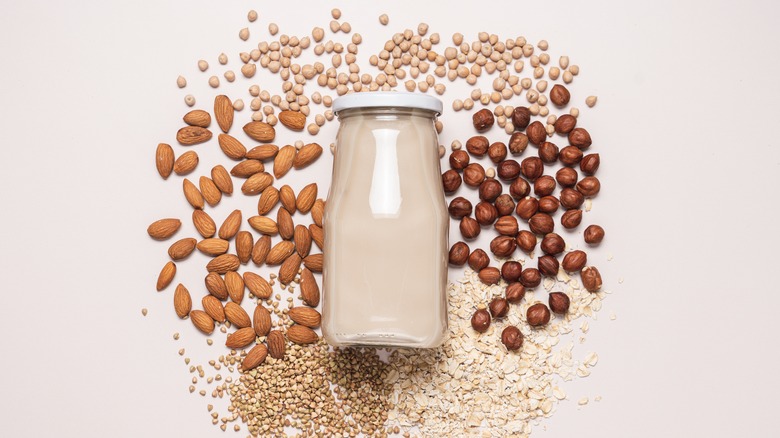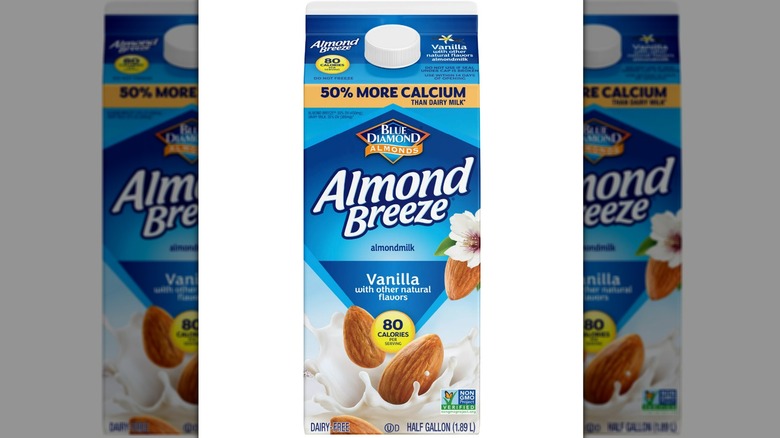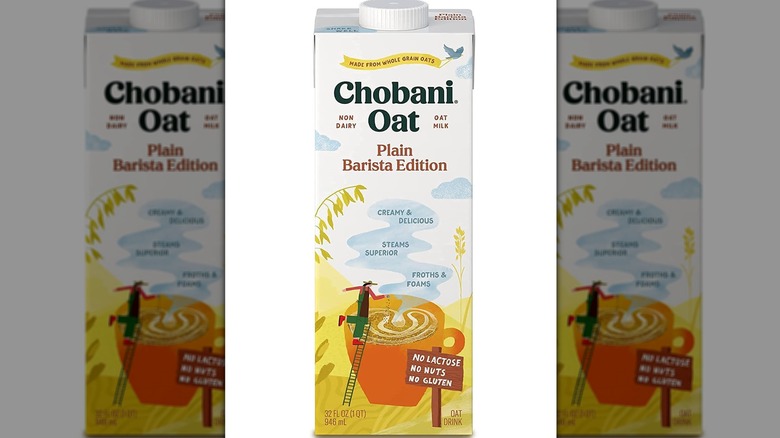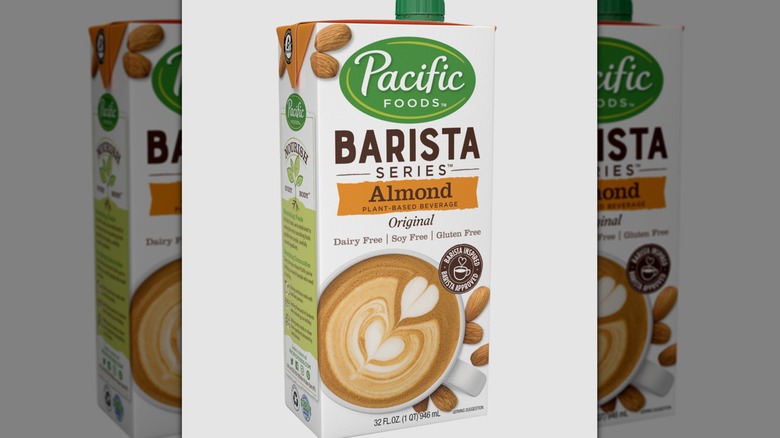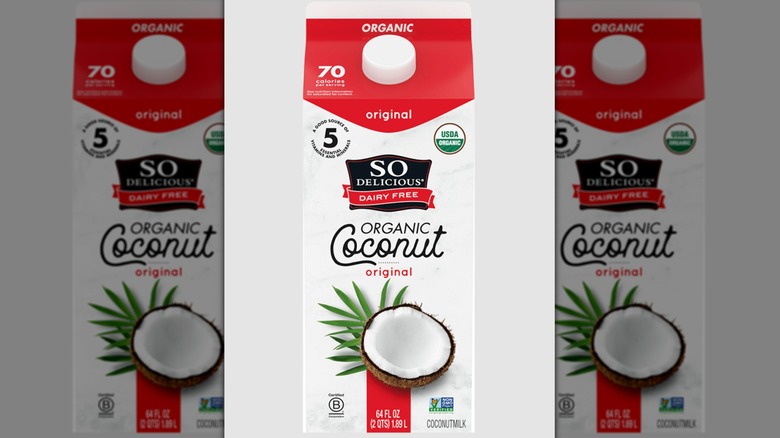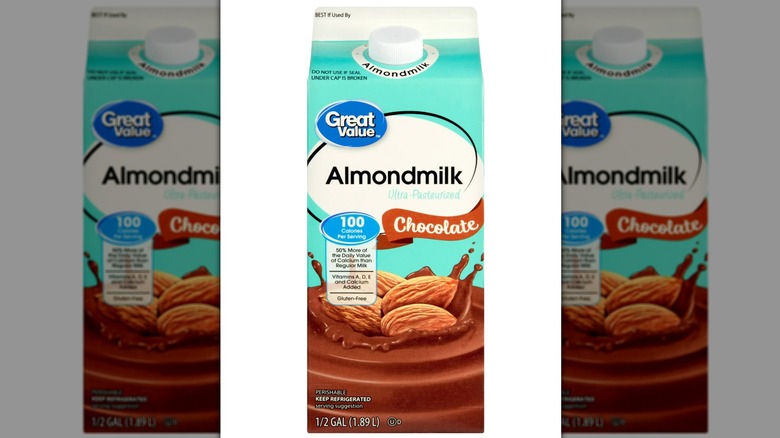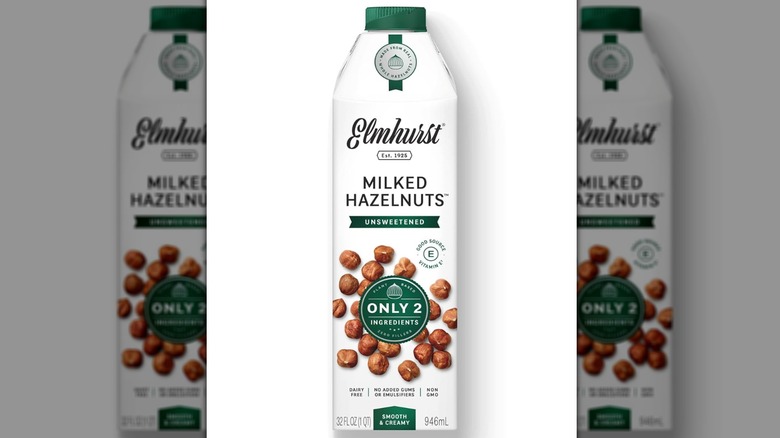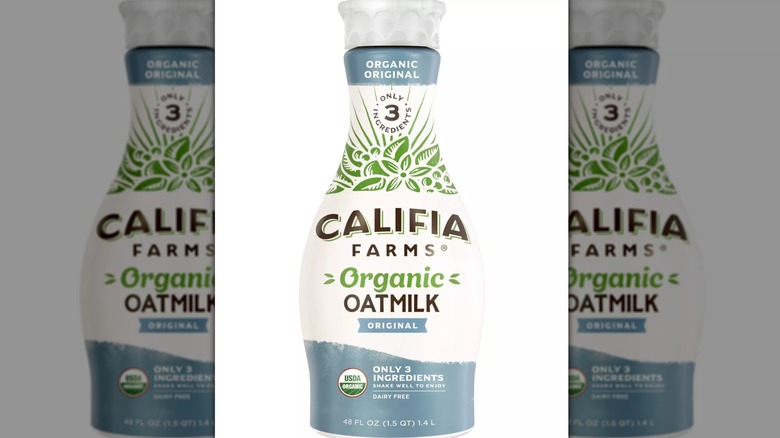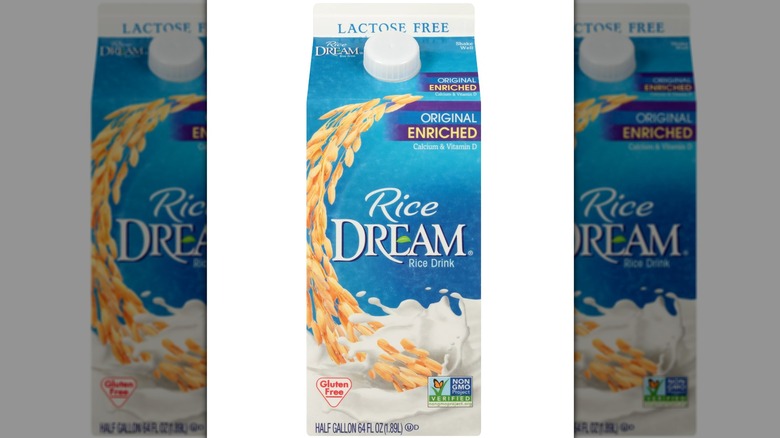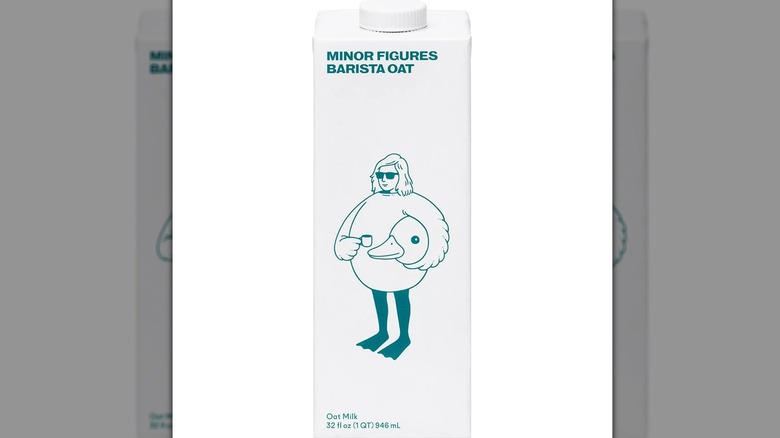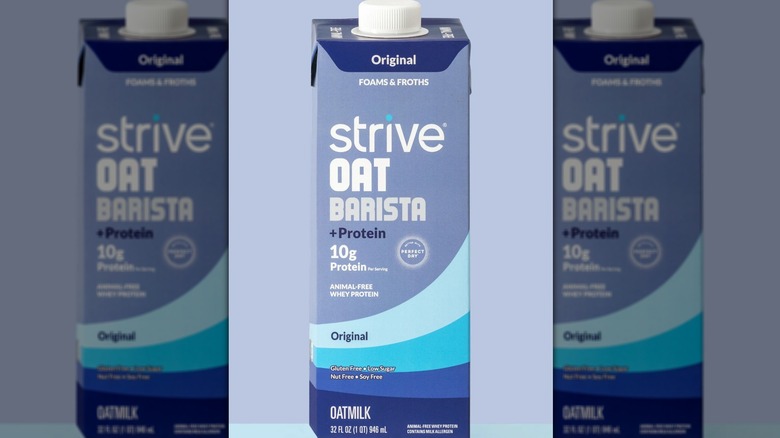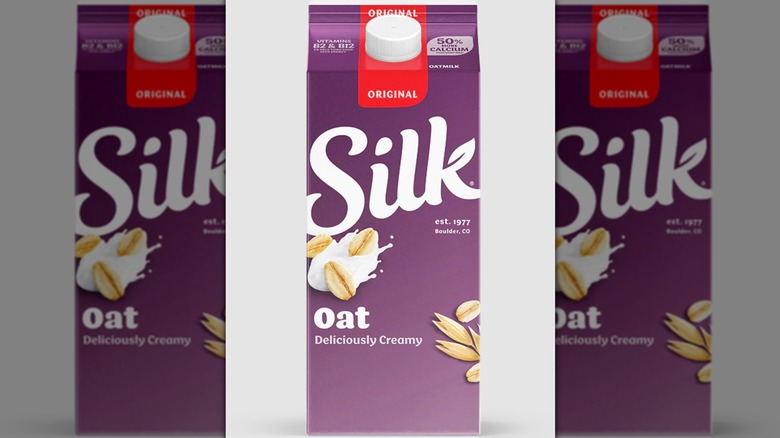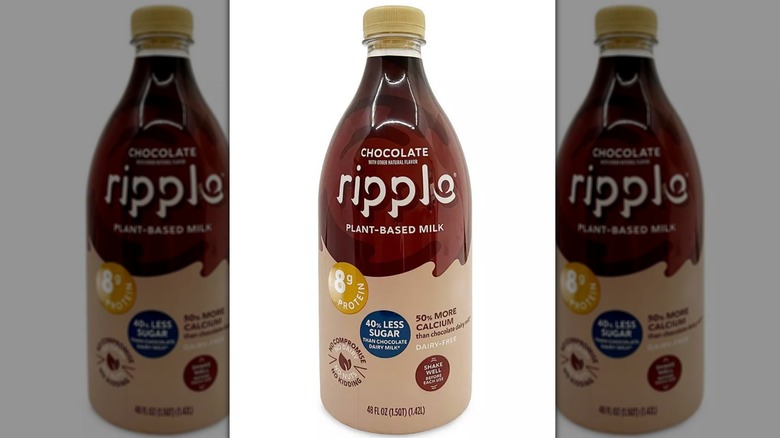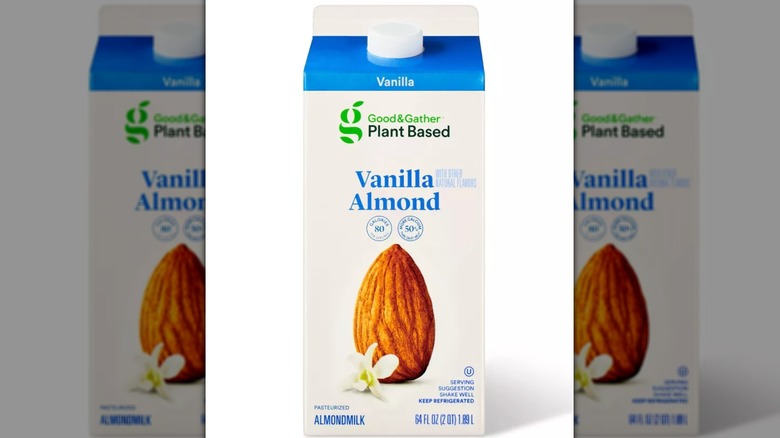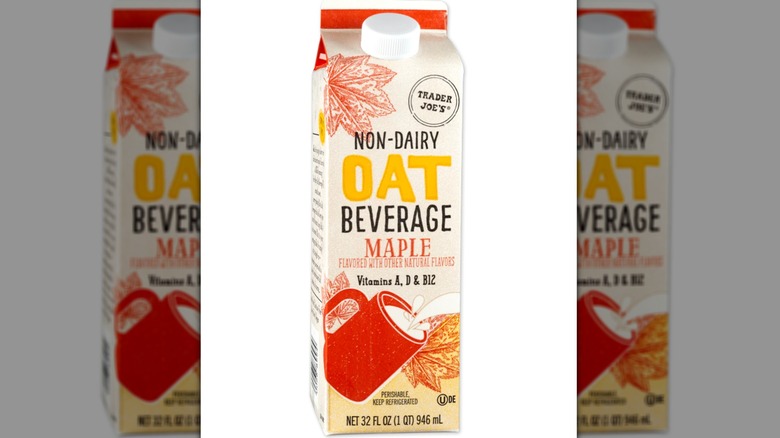The Unhealthiest Store-Bought Milk Alternatives
We may receive a commission on purchases made from links.
Gone are the times when the only thing you could put in your coffee was milk, cream, or powdered creamer. Plant-based milk alternatives like almond, oat, and soy milk have become a standard weekly purchase for countless people, with folks buying them as much for their flavor as for their potential nutritional benefits. "Although milk is only one small part of a person's diet, plant-based milk along with a plant-forward diet offers many benefits for your health and the environment," notes UCLA Health's senior dietitian Dana Ellis Hunnes (via UCLA Health), with these plant-based alternatives often giving you a creamy experience with less fat, sugar, and overall calories than cow's milk, as well as no hormones.
However, things aren't always rosy. "In general, these nondairy milks have been promoted as healthier and that's not necessarily the case," Melissa Majumdar told The New York Times. Certain milk alternatives can be lacking in essential vitamins, minerals, and protein. Others, meanwhile, can be high in added sugars or saturated fat or contain certain additives you may wish to avoid. It's products with these types of nutritional profiles that we chose to highlight in this article, to help you make the best choice you can with your milk alternatives.
Blue Diamond Almond Breeze Vanilla Almond Milk
Blue Diamond is one of the most prominent names in the milk alternative market, with the almond producer offering several types of almond milk. Its flavored versions, though, are not the best for your health. The Blue Diamond Almond Breeze Vanilla Almond Milk, for instance, has a pretty high amount of added sugar per serving, presumably to bring out its vanilla notes. With 12 grams per cup, a single serving of this almond milk will cover 25% of your daily value for added sugar.
This figure is made even worse when you consider the fact that Blue Diamond Almond Breeze Vanilla Almond Milk has barely any fiber in it (despite almonds being fiber-rich), which can play a key role in reducing how much sugar can spike your blood glucose levels. It's these kinds of details that you need to keep an eye on when buying your milk alternatives, says U.S. Food and Drug Administration's Center for Food Safety and Applied Nutrition director Susan Mayne. "The nutrients you get from plant-based milk alternatives can depend on which plant source is used, the processing methods, and added ingredients, so check the label carefully," Mayne says (via the FDA).
Chobani Oatmilk Barista Edition
If you've had oat milk before, it may well have been Chobani. The yogurt company has branched out into oat-based milk alternatives with considerable success. Success, however, doesn't equate to healthiness. Chobani's Oatmilk Barista Edition, which is created with frothing and foaming in milk, has a relatively high amount of added sugar, fat, and saturated fat in each serving.
Per cup, there are 7 grams of added sugar, a little more than you'd get in a serving of honey-almond-flavored granola. Combine the two, and you can end up with a pretty sugary breakfast. As well as this, this oat milk has 9 grams of fat and 1 gram of saturated fat in every serving, which comes as a result of rapeseed oil in its ingredients.
It's worth remembering that just because something's made of plants, doesn't mean that it's going to be lighter or lower in fat — and nor may it be sugar-free. Added sugar in drinks can be a huge issue health-wise, with excessive consumption of sugary beverages being linked consistently to higher rates of heart disease, diabetes prevalence, and even liver cancer. These added sugars don't just come in the form of sodas, either, and can be present in drinks as unassuming as oat milk.
Pacific Foods Barista Series Almond Original
Have you ever wondered how some milk alternatives end up so creamy and delicious? Pacific Foods might have the answer for you. The food producer's Pacific Foods Barista Series Almond Original almond milk has several ingredients lurking in it that add to its smoothness, and carrageenan is the one we're least pleased to see.
Carrageenan is a pretty prolific food additive that often finds its way into plant-based milk alternatives, as well as other food items that require emulsifying or stabilizing. Unfortunately, however, this additive (which is derived from red seaweed) has been linked to inflammation in scientific studies and is alleged by scientists to potentially raise the risk of developing chronic diseases like diabetes, heart disease, and cancer.
It's important to remember, too, that a lot of almond milk products available today don't have carrageenan in them at all, making Pacific Foods' case for including it in its recipe somewhat tenuous. As well as this, its Barista Series Almond Original also has a pretty high amount of added sugar in it, providing 8 grams per serving, 16% of your daily value. When you combine these two facts, it might be better to look for another almond milk entirely.
So Delicious Dairy Free Organic Original Coconutmilk
Anyone who's used coconut milk in a Thai curry or creamy dessert will know how smooth and luscious it is. It's hardly the type of thing you'll want to add to your coffee regularly. However, opening up a can every time you brew a cup of Joe doesn't sound great. As such, plant-based milk enthusiasts might be initially thrilled by So Delicious Dairy Free Original Coconut Milk, which seems to be crafted specifically for use in drinks and breakfast cereal. They may not be so thrilled, however, when they see its saturated fat content, with a whopped 4 grams per cup serving.
That amount of saturated fat is 20% of your daily value and is roughly the equivalent of stirring a half-tablespoon of butter into your coffee. This milk alternative also boasts (or doesn't boast) 0 grams of protein and has 7 grams of added sugar. It's worth noting that just because the fat content is from organic coconut cream, that doesn't mean that it's somehow better for you than other forms. High-saturated fat coconut oil has still been found to raise bad cholesterol levels, as well as raising the good kind.
Great Value Chocolate Almondmilk
Chocolate milk lovers may have initially struggled to find a plant-based version of their favorite drink, but then Walmart came along. Now, its Great Value Chocolate Almondmilk is just a short drive away and promises delicious flavor without any dairy. However, all that flavor has to be created somehow, and in this milk alternative, it's produced by including copious amounts of added sugar. With a massive 17 grams of added sugar per serving, just one cup will take out over a third of your daily value.
Now, you're probably not under any illusions that regular chocolate milk is sugar-free, but at least you also get some protein in your cup. In this chocolate milk alternative, there's just 1 gram. This means you don't benefit from any of protein's potentially stabilizing effects on blood sugar, which have been observed specifically in individuals with type 2 diabetes, as a 2003 study in the American Journal of Clinical Nutrition shows.
There's another reason you should probably watch out for that much added sugar. A systematic review of studies published in Nutrition Research and Practice found that consuming high amounts of added sugar-containing food with a low amount of other nutrients has been linked to a higher risk of all-cause and cardiovascular mortality. When sugar was present in foods containing sufficient other nutrients, though, it was less risky.
Elmhurst 1925 Unsweetened Hazelnut Milk
Hazelnut milk is far from the most common milk alternative out there, but a few brands are offering it, including plant-based milk supremo Elmhurst 1925. Unfortunately, its Unsweetened Hazelnut Milk isn't exactly bursting with nutrition. We're personally pretty big fans of the fact that it's unsweetened, but because it only contains two ingredients, it's a bit of a stretch to call it healthy when it contains no fiber, barely any protein, and also a comparatively low amount of vitamins and minerals. Instead, it gets its calories primarily from fat and saturated fat.
Its lack of vitamins and minerals comes from the fact that it's unfortified, and this could be more of an issue than you think, especially if you're switching from cow's milk. Cow's milk is routinely fortified in the U.S., with vitamins A and D and several minerals frequently added in. These nutrients can provide several health benefits, especially for immunity and healthy growth in kids, and can help to fill in blank spots in certain people's nutritional intake.
Califia Farms Organic Original Oatmilk
Califia Farms is a staple on the oat milk scene, and the inclusion of its Organic Original Oatmilk here might raise a few eyebrows. After all, its bottle boasts that it contains just three ingredients (water, organic oats, and sea salt), and if you take a scan of its nutrition label, it seems to have barely any fat, a fairly satisfying amount of protein, and a lower added sugar content than a lot of other alternatives.
However, that third ingredient — sea salt — is what puts us off. Containing 160 milligrams of sodium per serving, this oat milk will supply you with 7% of your daily value in every cup. We would argue that's a fairly high amount to consume in a beverage and could add up and contribute significantly to your daily salt intake. Consuming too much salt regularly has an impact on blood pressure, with potential consequences including cardiovascular disease. A 2022 study published in Nature Reviews Nephrology asserted that excessive salt intake could be behind roughly 5 million deaths yearly across the globe. As well as this, Califia Farms' oat milk doesn't exactly impress us with its lack of fortification – it appears to be entirely devoid of vitamins and minerals, with just a tiny bit of calcium.
Rice Dream Lactose Free Rice Drink
Rice milk is a bit of an underdog in the milk alternatives space, and Rice Dream is far and away the most well-known company bringing rice milk to market. It's a shame, then, that its Rice Dream Lactose-Free Rice Drink is made the way it is. Each cup of this rice milk has 14 grams of added sugar, over a quarter of your daily value. This is particularly notable considering that this is an unflavored milk alternative, with those added sugar levels usually being reserved for vanilla or chocolate-flavored versions of non-dairy milk drinks.
In addition to this, there's also absolutely no protein to be seen in this rice milk. If you're a big consumer of cow's milk, and you're swapping it out for this product, this could be a pretty big issue. There are just over 8 grams of protein in a cup of regular cow's milk, with that protein potentially contributing to a huge amount of bodily processes, like keeping metabolism healthy, helping you to build strong bones and muscles, and keeping your blood pressure in check. As the average middle-aged woman who weighs 140 pounds needs roughly 53 grams of protein a day, replacing a potentially rich source with an alternative lacking the nutrient may be slightly problematic.
Minor Figures Oat Milk
There's no doubt that Minor Figures is a pretty cool oat milk (we mean, just look at its minimalistic, cartoon-laden design). What's less cool, though, is its nutritional profile. This indisputably hip oat milk is fairly high in added sugars, especially for an unflavored milk alternative, and has 8 grams per serving. Additionally, there's just 1 gram of protein in each cup, making the oat milk pretty useless in terms of adding to your protein intake, and in terms of keeping your hunger at bay, per a 2014 study published in the journal Obesity.
We're also pretty unhappy with how scant its vitamin and mineral content is. While it does have a healthy amount of calcium per serving, there doesn't seem to be much else added to it via fortification. Vitamins and minerals, it should be remembered, help our bodies out with various processes, and certain types like folate are more readily absorbed when from a fortified food source. If you're used to getting a portion of your vitamins and minerals from cow's milk, switching to Minor Figures may slightly disrupt your balance. While this is pretty unlikely to be an issue, it's worth remembering that there are other oat milks out there that have better levels of vitamins and minerals.
Strive Oat Barista Protein
Strive Oat Milk Barista + Protein seems to address one of the main issues when it comes to milk alternatives: Their protein content. Tackling this by adding animal-free whey protein into its oat milk blend, the result is a frothable milk alternative that has an impressive 10 grams of protein, a touch more than regular cow's milk. When you combine this with the lack of added sugars in the drink, as well as the good levels of vitamins and minerals, things don't look too unappealing — until you clock its sodium content.
Each cup of Strive Oat Milk Barista + Protein has a high 250 milligrams of sodium in it. For comparison, that's roughly the same amount of sodium as a three-ounce serving of canned tuna and constitutes roughly 11% of your daily intake. That's a pretty significant amount to consume in a drink, especially when we're used to getting most of our sodium from solid food, and won't help if you're trying to tame a salt habit. It's products like Strive that reinforce the fact that you should always check your nutritional labels, to see what's included beyond the main nutrients (in this case, the milk alternative's protein), and to consider what the overall impact of consuming something is.
Silk Original Oat Milk
If you're able to find a range of oat milk products in a store, there's a likelihood that Silk will have made some of them. The oat milk manufacturer does tidy business in the market, but its flagship product leaves a lot to be desired nutritionally. It contains undesirable filler ingredients and preservatives. One cup of Silk Original Oat Milk will supply you with gellan gum, locust bean gum, ascorbic acid, the always-curious "natural flavors," and sunflower oil.
Now, importantly, all of these ingredients are fairly widely used, but they indicate a highly processed product — and on their own, some of them can raise eyebrows. Sunflower oil, for instance, has a fairly high omega-6 content by way of linoleic acid, which has been linked with higher rates of inflammation, per 2017 research published in the journal Healthcare. Nutritionally, too, Silk Original Oat Milk has 7 grams of added sugar, adding up to 14% of your daily value, and only 1 gram of protein. There are better options out there, folks.
Ripple Dairy-Free Chocolate Milk
Ripple is on a mission to make dairy-free milk for all tastes. The food company has a range of dairy-free milk alternatives, with chocolate and vanilla flavors featured prominently in its output, and it also has a version designed specifically for kids. Some of its options' nutritional profiles, though, might make you wince. Its Dairy-Free Chocolate Milk product is especially worrying, containing 15 grams of added sugar per serving. It might make it sweet, but it will also provide 30% of your daily value.
Its Dairy-Free Kids Milk, meanwhile, provides a pleasing amount of protein and good vitamin and mineral content for your little ones but also contains 5 grams of added sugar. It's worth noting how this is listed in its nutritional info, too. The label states that this is 10% of your daily value (which is, we'd argue, still a fairly high amount for milk). However, children should be consuming no more than 25 grams of added sugar per day, it's pretty clear that these quantities are for adults, not kids. As such, you could be giving your children way larger amounts of sugar than you intend to by choosing this milk.
Good & Gather Vanilla Almond Milk
As milk alternatives are so desirable food these days, it's little wonder that big supermarkets have started to produce their own. Unfortunately, though, healthiness and nutritional value don't always seem to be in their remit. This is pretty clearly shown by Target's Good & Gather Vanilla Almond Milk, which is supplied with sweetness from — you guessed it — a hefty amount of added sugar. With 13 grams of added sugar in each serving, this isn't the milk alternative with the most sweetness on our list, but it will still cover over a quarter of your daily allowance for the nutrient.
As one teaspoon of sugar equates to 4.2 grams, you're drinking down more than three teaspoons in one cup. Luckily, not all is lost for almond milk enthusiasts at Target. The store's Unsweetened Vanilla Almond Milk still packs vanilla flavor into each cup but has no added sugar at all. Making swaps to your regular purchases to prioritize low-sugar versions is a great day to cut down on your overall added sugar intake, which may prove to be a beneficial move for your heart and metabolic health.
Trader Joe's Non-Dairy Oat Beverage
Trader Joe's has always done things a bit differently as a retailer, and if you need any more proof of this, look to its non-dairy milk alternatives. The store offers a pretty funky selection of flavors in its milk alternative range, with its Maple Flavor Non-Dairy Oat Beverage standing out. However, all of that exciting taste is not provided by maple syrup, but by "natural flavors" and a high dose of sugar, packing 12 grams of added sugar into your cup.
The sugar listed in the recipe, as it so often is with other milk alternatives, is cane sugar. This may seem slightly more comforting than seeing "granulated white sugar" on the label, but don't be fooled by its name. Cane sugar, white sugar, brown sugar, and molasses all come from the same plant and are all just as capable of spiking your blood sugar and, in large regular quantities, contributing to chronic health risks and dental issues. Cane sugar also doesn't contain any vitamins and minerals, meaning that apart from its carbohydrates, it's nutritionally void.
